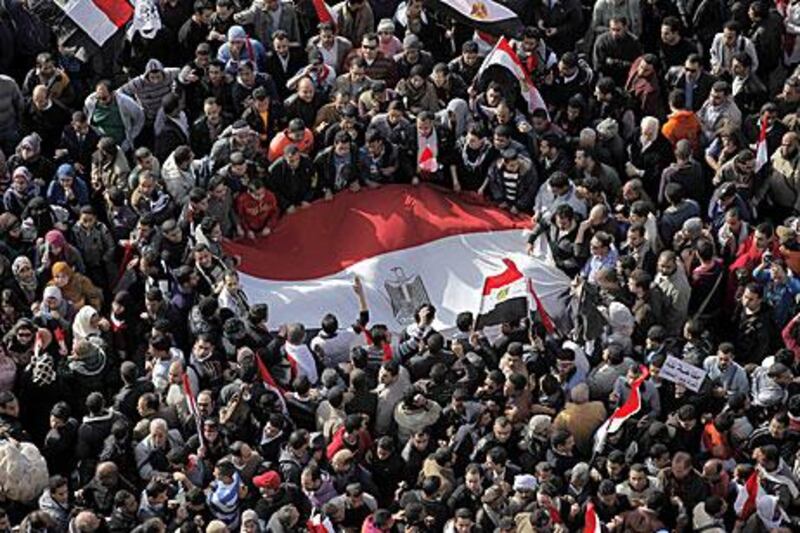CAIRO // Liberal activists chanted for the military to hand power to civilians. Islamists cheered their victory in the parliamentary elections. Four young men, wearing black and holding signs "mourning the blood of the martyrs", stood silently.
The 100,000 and more who streamed into Tahrir Square yesterday were a microcosm of political life in the country a year after Egyptians took to the streets to demand the end of the regime of Hosni Mubarak.
Amin Haddad, 53, an Egyptian poet, reflected on the sea of people around him as he stood in the shade of the Mugamma building on the southern edge of the square.
"Whether they are celebrating or protesting against the military, we now know the revolution is continuing," he said. "Nothing can challenge the legitimacy of this."
There were no signs of the "conspiracy to topple the state" that members of the Supreme Council of the Armed Forces (Scaf) and state television had warned of over the past month.
But as with previous demonstrations in Cairo, the real test could come in the days ahead. Some hard-core activists said yesterday they would remain in the square until the military handed power to the parliament or an interim civilian government. Several of the violent clashes last year took place between security forces and the remnants of mass gatherings who refused to leave.
The mood was upbeat, despite the view of many that few major goals of the uprising last year had been achieved. Since Mubarak's resignation on February 11 last year, Egyptians have had to bear the awkward and often repressive interim rule of the military. About 100 people have died and thousands more have been injured in battles with soldiers and police since the military took control. Reporters Without Borders, the international journalism body, said yesterday that freedom of expression had actually declined under the military rule.
"The only victory we've had was the parliament," said Samir Marai, 28, a car technician who has three shotgun pellets embedded in his leg and abdomen from battles with police during the 18-day uprising last year.
After what most observers and Egyptians have said were the freest and fairest elections for the lower house of parliament in 60 years, members convened for the first time on Monday.
"There is still a lot to do," Mr Marai said. "We have not even begun to achieve social justice. This is not a celebration, it is a continuation."
Standing near by was Mohammed Ahmed, 19, a student of applied arts at October 6 University, who echoed the dominant view in the square.
"I'm here to celebrate the revolution," he said. "To me, they are one and the same, protest and celebration. To be here now doesn't mean what we started has stopped."
Supporters of the Muslim Brotherhood's Freedom and Justice Party, which took 47 per cent of the seats in the parliamentary elections, were out in force. Many wore hats and pins with the party's logo of the scales of justice.
"We have tried many systems: socialism under Nasser, capitalism under Sadat and Mubarak," said Hisham Hassan, 42, an English teacher in Cairo, reeling off the names of Egypt's last three presidents.
"They didn't bring us what we needed. Now we want to try the Islamic way."
A small scuffle erupted between a group of Islamists and liberal activists who were chanting against the ruling generals, but largely they just traded insults throughout the day. One group of activists chanted: "Once upon a time there was a revolution that was hijacked by the military and the Brothers."
The tensions, which so far have remained peaceful, reflect the view of activists that the uprising they feel they initiated a year ago had been hijacked by the Islamist groups who relied upon their decades-old charitable infrastructure to bring out the votes that won them more than 70 per cent of the seats in parliament.
But the calls for a faster transition to civilian rule and resignation of the top military commander have softened in recent days as the parliament opened and the Scaf released almost 2,000 people who had been jailed under military law.
Scaf also announced a partial lifting of the emergency law that gave the military wide powers to arrest people and suspend constitutional rights. The law remains in place for vaguely defined "acts of thuggery".
Nazeema Saad Eldin, 38, a journalist in Cairo who joined the protests in Tahrir near Qasr El Nil Street yesterday, was elated at the turnout not because it was a celebration, but because of the stark contrast to a year ago.
"All I remember from that day was police chasing us and tear gas everywhere," she said. "I'm happy that we took Mubarak down, but I'm also sad. The system is still there.
"The blood of the martyrs stains every area of this square, even if we can't see it."
bhope@thenational.ae
Follow
The National
on
[ @TheNationalUAE ]
& Bradley Hope on
[ @bradleyhope ]





